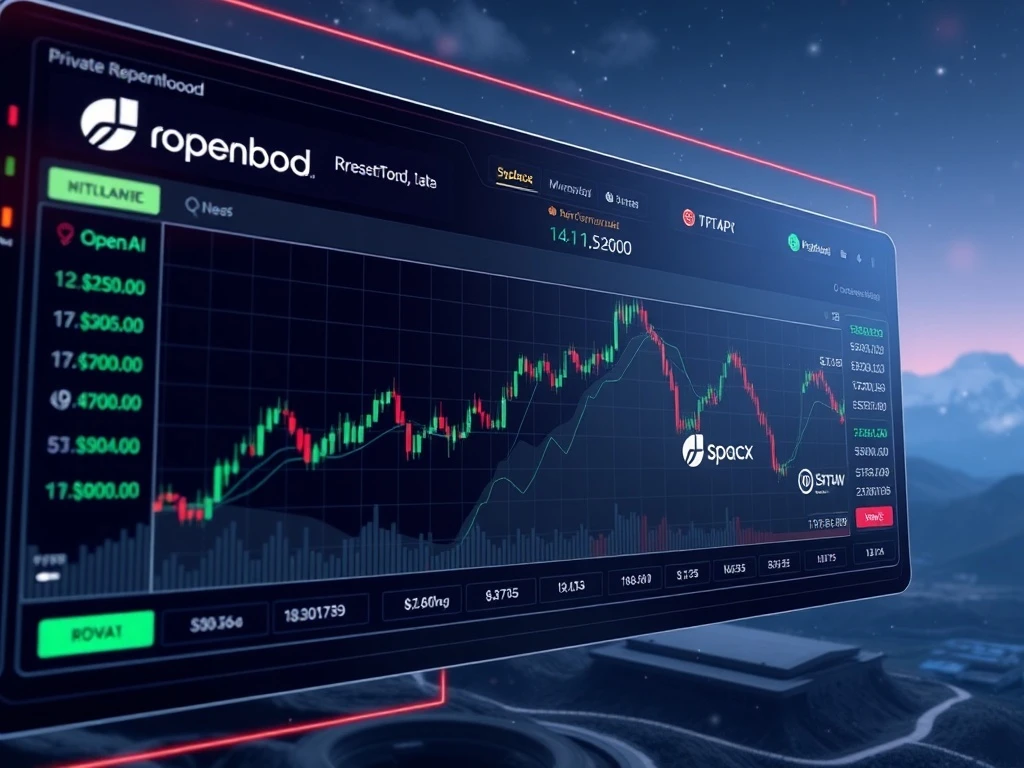Revolutionary Robinhood Tokenized Equity Platform Attracts Private Company Boom

Are you ready for a seismic shift in how private companies raise capital and how retail investors access high-growth opportunities? Robinhood’s recent foray into Robinhood tokenized equity in the European Union is not just another product launch; it’s a potential game-changer for the global financial landscape. This bold move is already attracting a deluge of interest from private firms eager to democratize access to their shares, setting the stage for a new era of blockchain-powered finance.
Robinhood’s Audacious Leap into Tokenized Equity
Last week, Robinhood launched its groundbreaking stock token platform in the European Union, a move that has quickly garnered significant attention. The platform currently offers over 200 tokenized US equities, available for trading five days a week. Beyond established public companies, Robinhood also introduced a promotional giveaway of non-tradable tokens representing highly sought-after private entities like OpenAI and SpaceX. This innovative approach aims to bridge the gap between exclusive private markets and the broader retail investor base.
According to CEO Vlad Tenev, the response has been overwhelming. In a recent interview, Tenev revealed a surge of inquiries from private companies keen to leverage this new avenue. “Since our announcement, I’ve had a deluge of inquiries, private companies that actually want to access retail to have their shares tokenized and be a part of this revolution,” he stated, underscoring the immense demand for such a product.
Why Private Company Shares Are Rushing to the Tokenization Platform
The allure of Robinhood’s tokenization platform lies in its promise to democratize access to investment opportunities that have historically been reserved for institutional and accredited investors. Private companies, especially those staying private longer, often limit retail participation, leading to what Tenev describes as a significant inequity in capital markets. By tokenizing their shares, these companies can potentially:
- Access Broader Capital: Tap into a vast pool of retail investors who are eager to participate in high-growth private ventures.
- Enhance Liquidity: While still in its early stages, tokenization could eventually offer more liquidity options for private shareholdings, which are traditionally illiquid.
- Increase Transparency: Blockchain technology inherently offers a transparent and immutable record of ownership, potentially streamlining cap table management.
- Future-Proof Fundraising: Position themselves at the forefront of financial innovation, adopting a technology that is increasingly seen as the future of asset management.
The vision is ambitious: Tenev aims to onboard thousands of private companies onto the platform, fundamentally reshaping how these entities raise capital and how individuals invest.
Navigating the Complexities of Crypto Regulation
As with any innovative financial product, Robinhood’s tokenized equity platform has attracted regulatory scrutiny. The Bank of Lithuania, which oversees Robinhood’s operations in the EU, has requested clarification on the structure and compliance of these tokens. Tenev welcomes this review, asserting the firm’s confidence in its offering.
Under EU law, these tokens are classified as derivatives, falling under the purview of the Markets in Crypto-Assets Regulation (MiCA) and the Markets in Financial Instruments Directive (MiFID). They are backed by underlying assets held by US brokers, with tokens minted or burned in direct correlation to user trades. This ensures a direct link to the real-world asset.
Discussions are also underway with regulators in the US and UK, though the platform is not yet available in these markets. Tenev believes the US Securities and Exchange Commission (SEC) possesses the existing authority to greenlight tokenization without new legislation. “The US shouldn’t be far behind. The opportunity is too large to ignore. Not just for retail but also institutional. And I think they’re keen. They’re having tokenization roundtables at the SEC, which we’ve been a part of,” he remarked. This engagement highlights Robinhood’s commitment to working within established frameworks to bring this innovation to wider markets.
The Promise of Blockchain Equity: A New Frontier for Capital Markets
The core of Robinhood’s strategy is to leverage blockchain equity to resolve a fundamental inequity in capital markets: the extended private tenure of massive companies. Historically, investors could participate in the early growth stages of companies like Google or Amazon when they were still private. Today, companies like OpenAI and SpaceX remain private for much longer, limiting access to early-stage growth for average retail investors.
By bringing these shares on-chain, Robinhood directly challenges traditional market channels. As Galaxy Digital noted, this move decentralizes liquidity and activity, potentially eroding the concentrated power of major TradFi exchanges like the NYSE. This represents a significant shift towards a more distributed and accessible financial system, where the benefits of growth are more widely shared.
The Global Momentum of Real-World Asset Tokenization
Robinhood’s bold step is not an isolated event but part of a surging global trend towards bringing real-world assets (RWAs) onto the blockchain. The market for asset tokenization remains red-hot, with increasing institutional interest and significant developments worldwide. Just recently:
- BioSig Technologies: This Nasdaq-listed company secured up to $1.1 billion in funding from an undisclosed institutional investor to support its plan to tokenize the commodities market. The deal includes $100 million in senior secured convertible debentures and a $1 billion equity line of credit.
- QCD Money Market Fund (QCDT): A joint initiative by DMZ Finance and QNB, QCDT received approval from the Dubai Financial Services Authority (DFSA). This marks it as the first tokenized money market fund established in the Dubai International Financial Centre (DIFC), signaling a strong regulatory endorsement for tokenized financial products in the region.
These examples underscore the growing confidence in tokenization as a viable and transformative technology across various asset classes, from commodities to money market funds and now, private company shares. The trend signifies a broader acceptance of blockchain’s potential to enhance efficiency, transparency, and accessibility in finance, despite ongoing challenges in crypto regulation.
Benefits of Tokenized Equity
- Increased Accessibility: Opens private investment opportunities to a wider retail audience.
- Potential for Liquidity: Offers a pathway for more frequent trading of traditionally illiquid assets.
- Fractional Ownership: Allows investors to buy smaller, more affordable portions of high-value assets.
- Global Reach: Facilitates cross-border investment more seamlessly.
- Transparency: Blockchain provides an immutable and verifiable record of ownership.
Challenges and the Road Ahead
- Regulatory Clarity: The evolving nature of crypto regulation globally remains a key challenge, requiring continuous dialogue and adaptation.
- Market Adoption: Widespread acceptance by both companies and investors will be crucial for scalability.
- Technological Integration: Seamless integration with existing financial systems is complex but necessary.
- Investor Education: Educating retail investors on the unique aspects and risks of tokenized assets is vital.
In conclusion, Robinhood’s bold venture into tokenized equity marks a pivotal moment in the convergence of traditional finance and blockchain technology. By democratizing access to private company shares, the platform aims to address long-standing inequities in capital markets. While regulatory landscapes are still taking shape, the overwhelming interest from private companies and the broader momentum in real-world asset tokenization suggest that this revolution is well underway. Robinhood’s journey will undoubtedly serve as a crucial case study for how blockchain can reshape the future of finance, making investment opportunities more inclusive and dynamic for everyone.









